
"Era una película que desarrollaba un tema muy propio de la contracultura de la época: la posibilidad de regresar a la naturaleza para vivir una vida al margen de la contaminación y de la vida moderna. Se trataba de una cinta de menos de diez minutos de duración, que contaba una historia breve pero ilustrativa de la naturaleza de los debates entre los jóvenes mexicanos cercanos a la contracultura. [...] La historia de Sergio García hacía una crítica al escapismo hippie, esperanzado por la posibilidad de crear un mundo alterno al de la realidad del capitalismo industrial" (Vázquez Mantecón, 2012).
"It was a film that developed a topic very related to the counterculture of the time: the possibility of going back to nature to live a life away from pollution and the modern life. The film lasted less than 10 minutes, and it told a brief but illustrative story about the nature of the debates between the Mexican youth that was close to the counterculture. [...] The story by Sergio García was a critique of the hippie escapism, hopeful for the possibility of creating an alternate world to the reality of industrial capitalism" (Vázquez Mantecón, 2012).
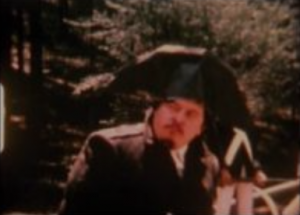
"Se trataba del regreso de un soldado de origen mexicano a la Ciudad de México después de haber combatido en Vietnam con las tropas estadounidenses. El hombre llega a la estación del ferrocarril de Buenavista y recorre la ciudad para acabar finalmente en el departamento de su hermano. Busca trabajo y no lo encuentra. Por la voz off que sigue el hilo de sus pensamientos, nos enteramos que a su mente guerrera le cuesta trabajo adaptarse a la vida pacífica. La película intercala una serie de secuencias oníricas que de alguna manera ilustran su delirio belicista: sueña que es un soldado griego que asesina al niño que lo molesta en el taxi colectivo (un pesero) que lo conduce a casa de su hermano; imagina en el personaje que lo entrevista cuando aplica para obtener un trabajo a Napoleón Bonaparte (interpretado por Juan José Gurrola) dirigiendo una batalla; o sueña que es un caballero medieval que asesina a su familia en un pacífico día de campo. Finalmente el personaje no encuentra cabida en la sociedad pacífica y acude –todavía en traje de caballero medieval – al aeropuerto para comprar un boleto de avión "a la guerra más próxima"" (Vázquez Mantecón, 2012).
"It is about the comeback of a Mexican soldier to Mexico City after fighting in Vietnam along with American troops. The man arrives to the train station in Buenavista y goes around the city to end up at his brother's apartment. He looks for a job and cannot find one. The off voice, that follows his train of thought, tells us that his war mind has trouble adapting to a peaceful life. The film inserts a series of dreamlike sequences that in a way illustrate his war delirium: he dreams he is a greek soldier that murders the kid that bothers him in a collective cab that drives him to his brother's house; he imagines the character that interviews him when he is looking for a job is Napoleon Bonaparte (played by Juan José Gurrola) directing a battle: or he dreams he is a medieval knight that murders his family in a peaceful day in the country. Finally the character doesn't find a place in a peaceful society and goes –still in medieval armor– to the airport to buy a by a plane ticket to the "nearest war" " (Vázquez Mantecón, 2012).
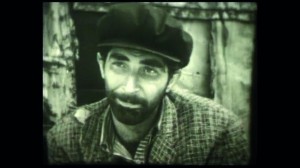
“Samim Kocagöz’ün “Teneke” adlı eserinden uyarlanmıştır. İşgüzar bir bekçinin uzun ve yorucu bir kovalamacanın ardından, yoksulluğunun gerçek yüzüyle karşılaşmasının öyküsüdür.” Sinematek.tv: http://sinematek.tv/asayis-berkemal-1967-2/ (15 Oct 2019).
“Adapted from Samim Kocagöz’s short story, “Teneke.” It tells the story of a meddlesome watchman/night guard, who faces the reality of poverty after a long and tiring chase.” Sinematek.tv: http://sinematek.tv/asayis-berkemal-1967-2/ (15 Oct 2019).
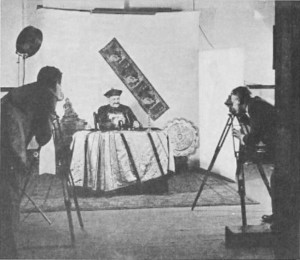
Promotes the all-round activities of YMCA work and their relationship to character-building. Kenyon, a one-time YMCA athlete, has "fallen into evil companionship" and become addicted to cocaine. Under the control of Chinese underworld kingpin Chang Yat, he aids in the kidnapping of a white girl. Afterwards, he discovers his old "Y" pin and recalls the role of YMCA athletics in shaping his character. Seized with remorse, he overpowers Chang Yat and helps the girl escape. Later, Kenyon returns to the YMCA. (D.J. Duffy, condensed from "Y.M.C.A. Cinema Club Produces Smart Film," Toronto Daily Star, May 31, 1930, p. 30.)
Film was sponsored or co-produced by the Central Y.M.C.A. of Toronto, and written by the club's secretary, H.G. McKinley.
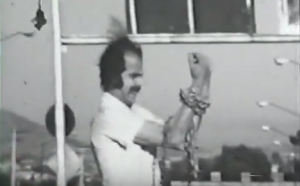
"A successful man living in a great metropolis is increasing awareness of the unjust social reality that lives in the absurdity. This immerses him in a uneasiness that sinks into alcoholism and depression. In his wandering through the streets viewer gets to be the unfortunate suicide of another victim of the meaninglessness of life, which will produce a series of dreamlike hallucinations bordering on the madness. In a stroke of consciousness of his misfortune, he does run aimlessly without course. Devastated, to the dawn, with the light of the dawn he sees to be reborn the hope personified in an innocent girl who stretches the hand donating bread" Internet Archive.
"Children Grow Up, photographed by Charles J. Carbonaro, ACL, and produced by The Religious Motion Picture Foundation, is one of the best examples of effectively handling amateur actors in a story telling film yet made. This three reel film was avowedly produced to point a moral in parent and child relationships and, as such, may be classed as social propaganda, a function in which it succeeds admirably. Yet the story it tells seems genuine and is of general audience interest. The film is carefully cut so that the action is logical and smoothly paced. Mr. Carbonaro is particularly to be congratulated for his handling of the difficult technique of parallel action, which occurs as the development of the children of two separate families takes place. Both streams of interest merge into one in a well planned, dramatic climax. The story is told entirely with the aid of amateur actors. Interior shots are in the majority and, for these, no special sets were built, the furnishings of the ordinary home being used. The lighting and exposure under these conditions are excellent throughout." Movie Makers, Dec. 1935, 534.
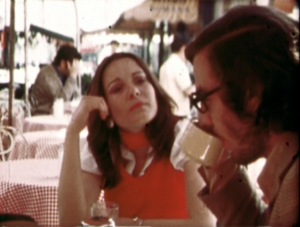
"Una cinta cargada de referencias a Jean-Luc Godard (Los Carabineros, 1963) pero sobre todo concentrada en la crítica mordaz al radicalismo de izquierda. Una vez más Marco Antonio Madrid hace el papel de protagonista, un joven de pelo largo, pantalón de mezclilla y saco, que se dedica a ligar en los cafés de la Zona Rosa adoctrinando a las mujeres. Lee a Marx después de hacer el amor, y se junta con sus amigos para brindar por "la muerte de la intelectualidad burguesa". Montero utiliza intertítulos como recurso irónico, una suerte de narrador externo que interpela la historia: "¿Qué es la intelectualidad burguesa?". La lucha revolucionaria del joven y sus amigos está teñida de sentido del humor. En una secuencia que recuerda mucho a Los Carabineros, suben al techo de una fábrica para iniciar la lucha armada (...) Por último un cartel proporciona una última burla: "Y si el sol es burgués detendremos al sol" " (Vázquez Mantecón, 2012).
"A film loaded with references to Jean-Luc Godard (The Carabineers, 1963), but above all focused on biting criticism to the radical left. Once again Marco Antonio Madrid plays the role of the lead character, a young man with long hair, jeans and coat, that dedicates his time to hook up in the coffee shops of the Zona Rosa indoctrinating women. He reads Marx after making love and he gets together with his friends to toast for the "death of the bourgeois intellectuality". Montero uses intertitles as a resource for irony, a sort of outside narrator that interpellates the story: "What is bourgeois intellectuality?". The revolutionary fight of the young man and his friends is filled with a sense of humor. In a sequence that reminds us of The Carabineers, they go to the rooftop of a factory to begin the armed fight. (...) Finally a sign shows one last derision "And if the sun is bourgeois, we will stop the sun" " (Vázquez Mantecón, 2012).
"On the challenge of social problems facing the nation's churches. Illustrates poverty, gambling, alcoholism, and drug abuse among teenagers and adults in New York City slum areas." National Archives.
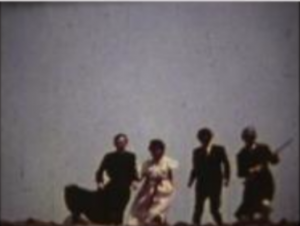
"Una historia sobre el acoso sufrido por la juventud por parte del mundo de los adultos. La posición alternativa del grupo [de realizadores] se hacía explícita desde las primeras tomas, en donde los créditos aparecían escritos en las paredes de una casa en ruinas, omitiendo los apellidos y dejando solo los nombres de pila de quienes participaron" (Vázquez Mantecón, 2012).
"A story about the harassment suffered by the youth from the adult world. The alternative position of the group [of filmmakers] was made evident from the first shots, where credits appeared written on the walls of a house in ruins, omitting last names and leaving only the first names of the participants" (Vázquez Mantecón, 2012).
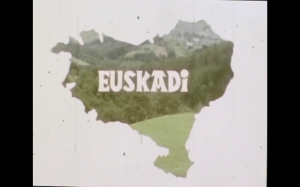
Documental sobre la política y ciudadanía euskalduna durante los años 70. El autor hace un recorrido por diferentes acontecimientos inscritos en los procesos de lucha y represión que tuvieron lugar durante el franquismo y primeros años de democracia.
Documentary about the Basque politics and citizens during the 70's. The filmmaker goes through different events inscribed in the struggle processes and the repression that took place during Franco's dictatorship and the first years of democracy.
Total Pages: 3